Mark Fosson – kY
Big Otis Records – CD Time: 42:27
Tracks: 1) Jimmy Leg Mule 2) Loose Change 3) When We Were Young 4) Kingdom Come 5) Indian Summer 6) Dogwood 7) Simpleton 8) Cold Dark Hollow 9) Avondale Strut 10) A Drink w/ Stephen F. 11) Bad Part Of Town 12) Kentucky 13) Come Back John
Purchase CD here: https://markfosson.bandcamp.com/album/ky
Curious how things happen sometimes…
In the past few weeks I had been revisiting a number of acoustic guitar recordings from the United Artists era (early career) of Gordon Lightfoot, the vast acoustic 12 string guitar works of English composer Anthony Phillips (some recorded with Harry Williamson, like the open tunings of Gypsy Suite), Tompkins Square’s Imaginational Anthems series and even Mark Fosson’s Digging In The Dust. Then, I received a quite unexpected message from Fosson himself, asking if I’d be interested in reviewing his new album kY (named as an homage to his Kentucky roots and memories of his time there). His first album was recorded for John Fahey’s Takoma Records label in the late 1970s, but the label was sold before the album could be released (and it finally emerged courtesy of Drag City in 2006). Tompkins Square released Digging In The Dust in 2012, the 1976 demo recordings that ultimately led to the Takoma Sessions.
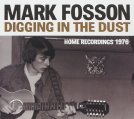
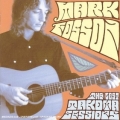
American Primitive Guitar, to some, is an obscure music genre (not to be confused with the American Primitivism art movement of the late 1890s). John Fahey’s pioneering acoustic guitar work in the 1950s developed an instrumental form of country blues finger-picking, and later attracted Leo Kottke, Peter Lang and others. In the 1960s and 1970s other techniques expanded the genre to include Robbie Basho, Mark Fosson, Jack Rose, and more recently Daniel Bachman, James Blackshaw and William Tyler (who works with both acoustic and electric guitars)…there are many others, and I am by no means an expert…just a general practitioner and admirer of many music genres and eras with some specialization in a few.
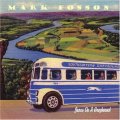
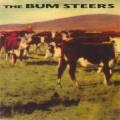
For background, Mark kindly provided a link to a recent interview at the excellent North Country Primitive website, which has some great insights on the album as well as what Fosson has been working on since those …Lost Takoma Sessions. For those interested in the specifics on the guitar tunings and instruments used on kY, I have linked directly to that interview here—it’s a great read. I have a hard enough time getting my slow fingers and feeble brain around the standard guitar tuning EADGBE let alone the many tunings like CFCFFC, so I marvel at the picking and musicianship within kY.
I am acquainted with some of Fosson’s other works spanning the time from 1976 to now, such as his solo work Jesus On A Greyhound as well as his band The Bum Steers. Fosson is also well known for the wit of his lyrics, but kY is an instrumental album, the music tells the stories, and the expressiveness and visual references emanating from the strings and fingers more than suffice in lieu of words.
kY is an album of clever and sensitive musical prose. Each piece being conceived and recorded almost spontaneously, most on first takes according to Fosson, to preserve the vibrancy of the moment. Laterally, this keeps the album unfettered of sentimentality, and refreshingly expressive even when the subject is poignant. A Drink With Stephen F, for example, went right to my core, and I felt like I had traveled through time and been a witness to the encounter—powerful stuff.
The pieces vary from portrayals of places, events and people. Four pieces are recorded with twelve-string guitar, two with banjo, one with dulcimer, two with guitars and bass (multi-track) and only two are in standard EADGBE tuning. I’m not sure what recording equipment Fosson used (analog or digital, microphones, etc.), but the quality and sound of the recording is so pure and crystalline—like a private concert in my living room. The final notes and harmonics on Come Back John just ring out, then sing on.
With the benefit of some insights from Mark Fosson (always helpful hearing it from the artist), an overview of kY, in the order of the recording:
Jimmy Leg Mule is a playful and somewhat unpredictable mule ride, with involuntary forays into mild dissonance due to that jimmy leg “condition”, along with moments of spirited progress, and occasional stubborn pauses–not unexpected from a mule. Loose Change is a somewhat gleefully reckless ensemble of guitar, bass, mandolin and slide guitar, which meanders from tight assemblage to rather “loose” chord interactions, and ultimately (and intentionally) to what author Henry Williamson referred to as a somewhat humorous “mingled despair” ending. Fosson recalls his grandparents in When We Were Young, a 12-string tribute, which varies from spirited interactions to moments of contemplation. The pace is that of a story being told, with occasional diversions (like pulling recollections from a distant hazy past), and resolved chords seem as welcome moments of reminiscing. Gradually, the themes fragment, and fade, like memories. When We Were Young periodically channels the sound of a venerable 19th century disc music box. Kingdom Come is a real place in eastern Kentucky (along with a State Park bearing the same name), and this banjo piece seems to capture the rugged yet reverent spirit of the place, although I have not been there…yet. As one might expect within a languid Indian Summer, Fosson’s 12 string jangles with a deliberate and steady heartbeat of keeping on, despite the heat.
I’ve always wanted to build a dulcimer, but for now listening to one will have to do, and Dogwood is a song of the country, and it could accompany a traditional dance or celebrate the arrival of spring, as those trees blossom. Simpleton has a cheerful and persistent aura with moments of pause for more intimate encounters. The second verse slips to a comparatively minor key, but the original balanced theme returns for the third. Fosson notes there was a man in his hometown with a sort of impairment who was a fixture. Fosson’s parents referred to this gent as the local “ambassador of good will”, others may have referred to him as something else less complimentary (we had one in my own town, we dubbed him: “the mayor”). It’s a jovial and charming portrayal.
Cold Dark Hollow is a slightly mysterious place where exploration is better fleeting with only brief moments of exploration, but not too closely, due to the chill. Fosson expressively flicks and buzzes his guitar. The second ensemble piece on the album is the 12-string guitar and bass Avondale Strut. It’s a lively gathering where folks have a good time after a spell of hard work. As I noted already, A Drink w/ Stephen F (in standard EADGBE tuning) stopped me in my tracks the first time I heard it, with its poignancy and clarity. The Stephen F is Stephen Foster, often referred to as the “father of American music” who died far too young and in a bad way (rough going back then, in the Bowery, where he died). It’s a respectful homage with an elegant and relatively unadorned melody. Some of Foster’s work has been forgotten to time and some remains well known (and is often labeled as “traditional”—do-daw, do-daw). This just exudes history and respect.
Bad Part Of Town swaggers furtively, yet it’s a cautious adventure as the banjo-ed observer passes through a neighborhood that is sometimes better avoided. Although Fosson isn’t entirely sure of the exact source of inspiration, Kentucky picks and snaps with a spirited liveliness. Closing the album is Come Back John, and is a fitting 12-string homage to mentor John Fahey. Fosson notes it was his desire to evoke Fahey’s Sunflower River Blues, and he does so with gracious aplomb.
I am often left unfulfilled by music that demands my attention. kY, however, is an album where an observant and clever artist deftly translates memories from mind to fretboard and fingers, creating authentic and fulfilling recollections. I’m not entirely sure this album qualifies exclusively as American Primitive Guitar (remember, I’m no expert), and there are no sixteen-minute free-range ramblers, but Mark Fosson instead has given us a collection of tidy and cohesive sound-memories, and they all work just fine, thank you.
Word has it that Mark Fosson has much more in the hopper, ready to record—excellent news!

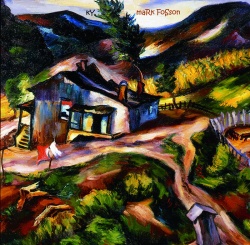
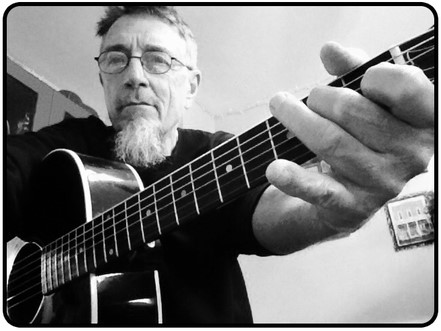
Reblogged this on wajobu.
March 15, 2016 at 12:39 pm